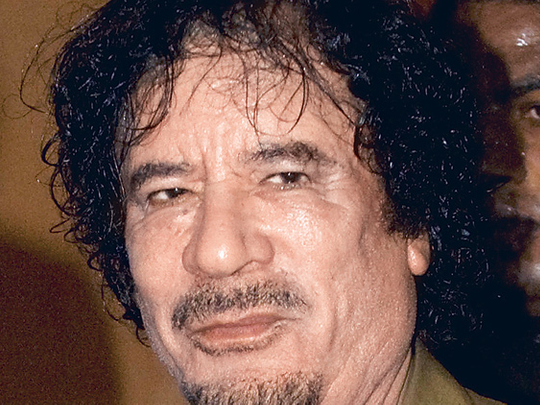
The Hague: Judges at the International Criminal Court will decide on Monday whether to issue an arrest warrant for Libyan leader Muammar Gaddafi for crimes against humanity.
A panel of three judges will at 1pm (1100 GMT) give their response to a request by the court's prosecutor, Luis Moreno-Ocampo, to have Gaddafi, 69, his 39-year-old son Saif Al Islam and another close associate arrested.
They can grant the request, request more information or simply turn it down.
In May, Moreno-Campo asked for warrants for on counts of murder and persecution committed since mid-February when the bloody uprising started.
The third man targetted is Gaddafi's brother-in-law and the head of Libyan intelligence, 62-year-old Abdullah Al Senussi.
Moreno-Ocampo's investigation came after the case was referred to the court by the United Nations Security Council on February 26. His office launched its investigation five days later.
It will be the second time the prosecutor has had a head of state in his sights: in March 2009, judges granted his request for a warrant for Sudan's Omar Al Bashir, but it has yet to be executed.
In his submission, Moreno-Ocampo accused Gaddafi of having had a personal hand in planning and implementing "a policy of widespread and systematic attacks against civilians and demonstrators and dissidents in particular.
"Gaddafi's plan expressly included the use of lethal force against demonstrators and dissidents," it added.
It cited as an example the night of February 20, when Gaddafi's security forces fired at peaceful demonstrators walking towards Tripoli's Green Square.
Gaddafi had ordered snipers to target civilians leaving mosques after evening prayers and his security forces had rounded up and detained alleged dissidents, it said.
"As a result, demonstrators, political activists, journalists and persons who shared information with the media, among others, have been systematically arrested. The whereabouts of many of them are unknown.
"Gaddafi's plans were carried out through his inner circle, which included Saif Al Islam, Gaddafi's de-facto prime minister and his brother-in-law Al Senussi, considered to be his right-hand man."
Earlier this month, Moreno-Ocampo told the Spanish paper El Mundo he hoped Gaddafi would be detained "by the Libyan people."
Libyan government officials have retorted that Tripoli is "not concerned" by the court's decisions since it is not a party to the Rome Statute that founded the ICC.
But Moreno-Ocampo has argued that Libya is legally bound to cooperate with the court under the terms of the UN Security Council resolution.
In Libya, Gaddafi himself remains defiant.
"We will resist and the battle will continue to the beyond, until you're wiped out. But we will not be finished," he said in an audio message broadcast on Libyan television late Wednesday.
Established in 2002, the ICC is the world's first permanent, treaty-based court set up to try those accused of war crimes, crimes against humanity and genocide if the accused's own country cannot or will not do so.












